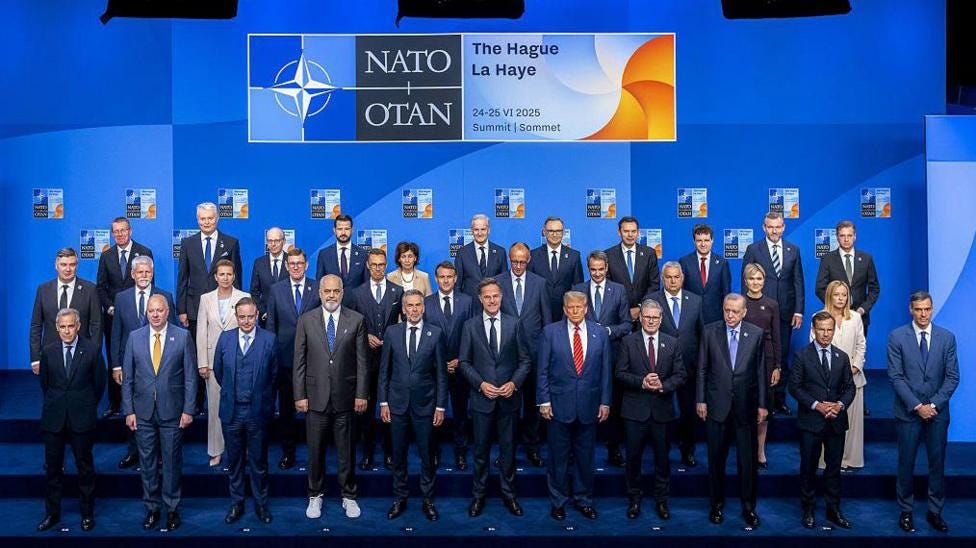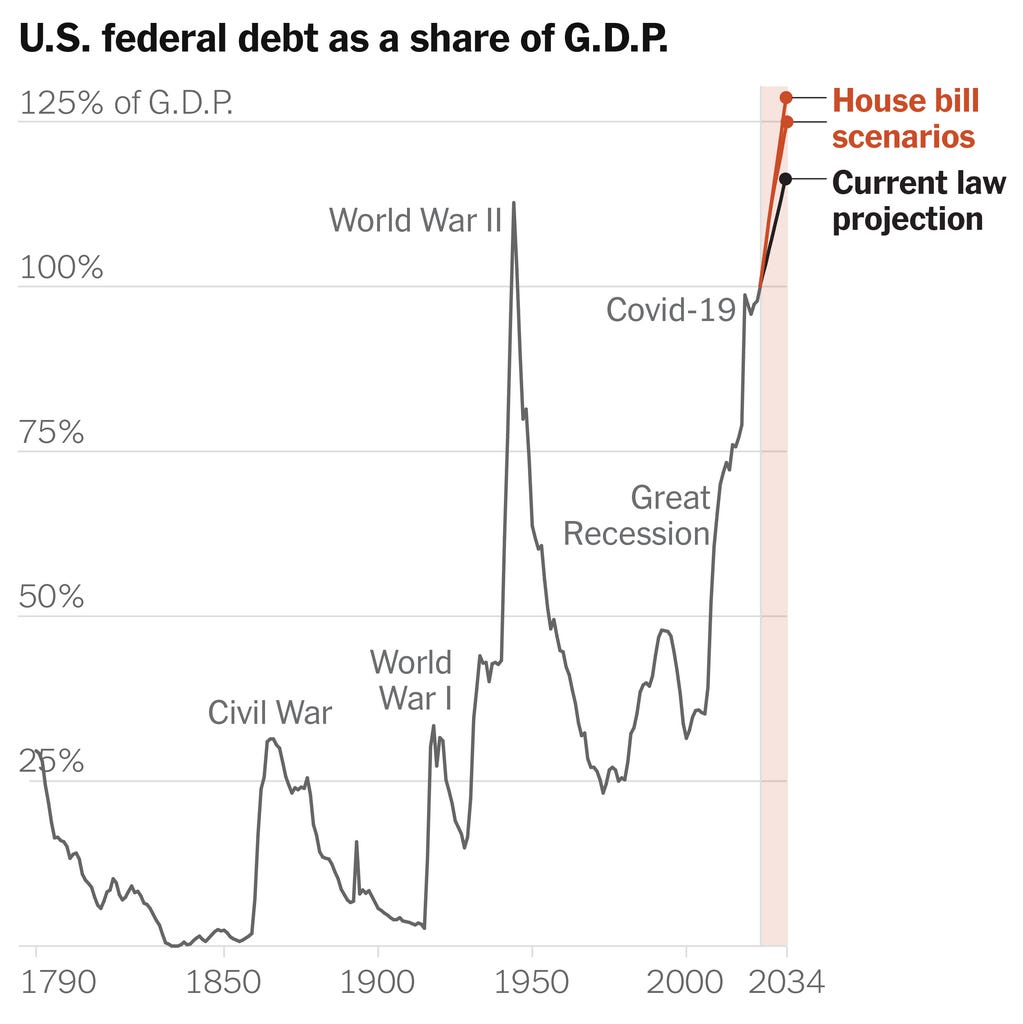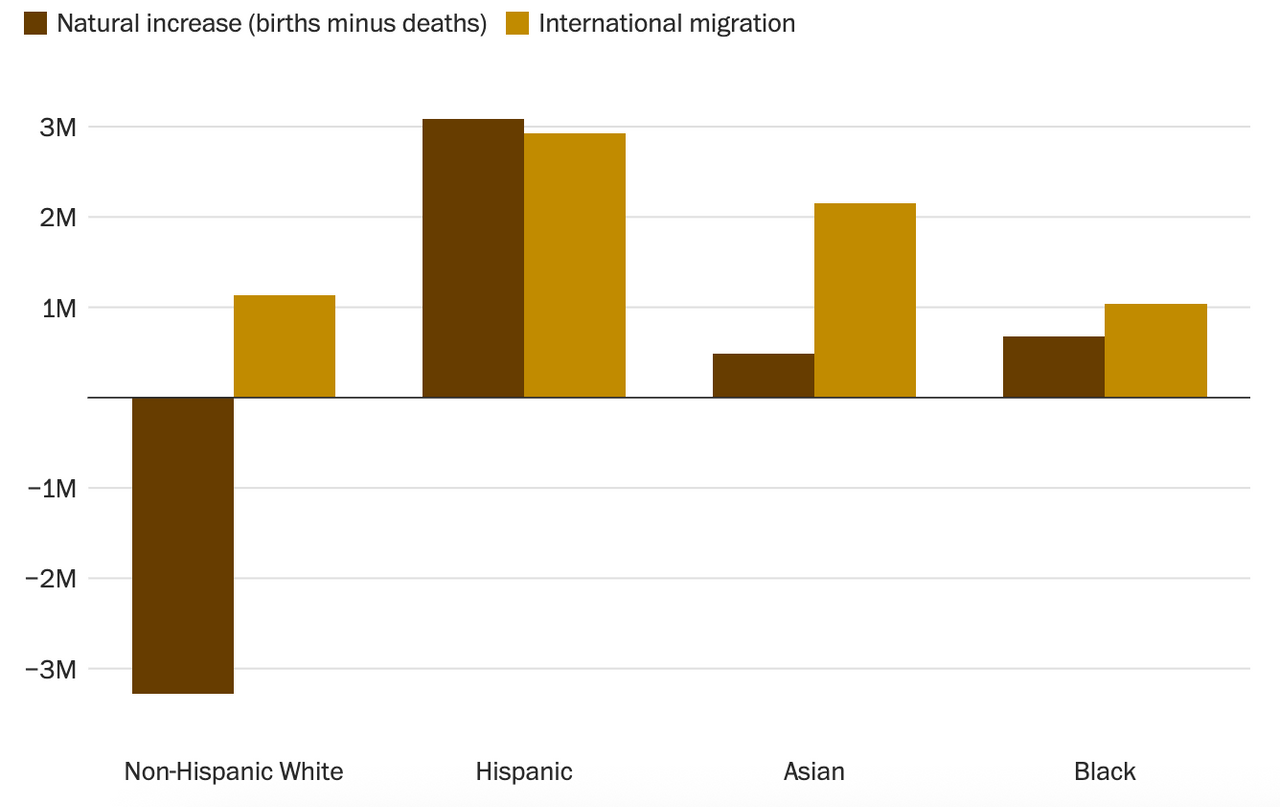Trump DOJ sues 15 federal judges in Maryland over deportation order. Legal experts call it an unprecedented attack on judiciary.
“Government lawyers say they’re aiming to preserve President Donald Trump’s constitutional authority over immigration.”
Read the story at Washington Post
© The Associated Press | Markus Schreiber
Trump team ramps up defense of Iran strikes
“The White House is scrambling to address growing questions about its military strikes on Iranian nuclear sites, as President Trump and top officials insist the decision to bomb facilities has significantly set back Tehran’s nuclear efforts.
The Trump administration today will dispatch CIA Director John Ratcliffe and other officials to Capitol Hill to brief senators while Defense Secretary Pete Hegseth plans to hold a Pentagon news conference this morning ‘in order to fight for the Dignity of our Great American Pilots,’ Trump said.
The president took a shot at media coverage of the Iran strikes while touting Hegseth's appearance on Truth Social, promising it ‘will prove both interesting and irrefutable.’
The Hill: Trump fights to hold on to narrative of Iran win
The Hill: Questions around success of Iran strikes spark fears on Capitol Hill
Ahead of his Hill visit, Ratcliffe reinforced Trump’s statements that U.S. bunker-buster bombs dropped on multiple Iranian nuclear enrichment facilities effectively ended Tehran’s nuclear weapons program.
‘New intelligence from an historically reliable and accurate source/method" found that "several key Iranian nuclear facilities were destroyed and would have to be rebuilt over the course of years,’ Ratcliffe said in a statement.
The CIA chief, a former member of Congress, is updating lawmakers after the administration postponed planned briefings Tuesday.
Trump said during a news conference in the Netherlands at the NATO Summit on Wednesday that Iran did not remove its near-weapons-grade uranium before the U.S. bombings. He said uranium is now buried beneath ‘granite, concrete and steel’ under Iran’s blackened facilities.
‘We think we hit them so hard and so fast, they didn’t get to move [it],’ the president added. ‘We think we got it.’
Vice President Vance and Hegseth have also described the uranium as buried.
The Hill: Trump, Hegseth scoff at Iran damage assessment; leak probe underway.
The New York Times: Secretary of State Marco Rubio fleshes out Trump’s case that Iran’s nuclear capacity was eliminated.
As it escalates its public defense of the strikes, the administration says it will also impose new limits on intelligence sharing with Congress after the president lambasted media outlets that reported preliminary findings from a Defense Intelligence Agency (DIA) damage assessment.
Trump said information reported by news outlets was inconclusive and overtaken by additional intelligence, including from Israel.
Democratic lawmakers, including Senate Minority Leader Chuck Schumer (D-N.Y.) and House Intelligence Committee ranking member Rep. Jim Himes (D-Conn.), urged the administration to reconsider any information blackouts.
‘The law requires the congressional intelligence committees to be kept fully and currently informed, and I expect the Intelligence Community to comply with the law,’ Himes said.
Trump pointed to a statement from the Israeli Atomic Energy Commission that the strikes ‘rendered the enrichment facility inoperable.’ The statement was distributed by the White House and the office of Israeli Prime Minister Benjamin Netanyahu.
‘The American strikes on Iran’s nuclear facilities, combined with Israeli strikes on other parts of Iran’s military nuclear program, have set back Iran’s ability to develop nuclear weapons by many years,’ the statement said.
Iranian Foreign Ministry spokesperson Esmail Baghaei told Al Jazeera, ‘Our nuclear installations have been badly damaged, that’s for sure.’
Director of National Intelligence Tulsi Gabbard, recently rebuffed by Trump, said Wednesday that ‘new intelligence’ confirmed the Iranian nuclear facilities were destroyed.
The president said he doubts Iran would seek to rebuild its nuclear program, but if it tried, he suggested the regime would need years.
Trump also expressed confidence the U.S.-brokered ceasefire between Israel and Iran can hold. ‘I think the war ended, actually, when we hit the various nuclear sites with planes,’ he told reporters.
A majority of Americans, 56 percent, said they disapproved of the U.S. strikes in Iran, according to a CBS News/YouGov survey this week. The administration’s messaging has emphasized U.S. military prowess and assertions that Trump attained his goal to prevent Iran from possessing a nuclear weapon.” [The Hill]
“THE VICTORY LAP CONTINUES: President Donald Trump took center stage at the NATO summit in the Netherlands today, touting his brokered ceasefire between Iran and Israel that seems to be holding, as well as the defense spending commitment that he secured from NATO allies — a ‘monumental win for the United States’ as Trump called it.
What Trump said: The president spent a large portion of a nearly hourlong news conference blasting the intel assessment reported yesterday that found Iran’s nuclear capabilities had only been set back by months. ‘We think we hit ’em so hard and so fast, they didn’t get to move,’ Trump said, while slamming the NYT and CNN for their reporting. ‘We destroyed the nuclear. It’s blown up … to kingdom come.’ He even compared the attack to the nuclear bombs detonated in Hiroshima and Nagasaki in 1945, Reuters’ Jeff Mason and Gram Slattery report. ‘This ended a war in a different way,’ he said.
Especially upset: Secretary of Defense Pete Hegseth, who’s ordered a Pentagon investigation into the initial assessment leak per POLITICO’s Paul McLeary. Hegseth said at the news conference there was ‘low confidence’ in the initial report on the damage, adding: ‘If you want to make an assessment at what happened at Fordo, get a big shovel and go deep, because Iran's nuclear program is obliterated.’
The damage: Iran’s Foreign Ministry said today that their nuclear installations were ‘badly damaged’ but didn’t provide many more details, Bloomberg’s Dana Khraiche reports. Trump said in a Truth Social post that Israel backed up his ‘OBLITERATED’ claim.
What comes next: Trump said he’ll be talking with Iran next week, and he will ‘probably’ ask for a written statement that Iran won’t pursue a nuclear weapon again. ‘But they're not going to be doing it anyway,’ adding that it’s a possibility Iran signs an agreement. Asked whether the two sides could resume fighting, Trump said ‘I think they're very much finished.’
WORD PLAY: NATO allies cemented their agreement today to boost defense spending to 5 percent — but not all the allies, thanks to the language in the group’s comminqué, NYT’s Lara Jakes writes. ‘The difference lies in a bit of mushy diplomatic language that lets the NATO secretary general, Mark Rutte, claim that he delivered on President Trump’s spending demand. The brief and unanimously approved communiqué that NATO issued after leaders wrapped up their annual summit says that ‘allies’ — not ‘all allies’ — had agreed to the 5 percent figure.’
Striking back: Trump lashed out at Spain, which didn’t agree to the 5 percent bump, and signaled he’s ready to retaliate for what he views as an ally not stepping up to the plate — threatening Madrid will pay ‘twice as much’ in tariffs in a renegotiated trade deal, POLITICO’s Eli Stokols and Felicia Schwartz report. And yet, Trump ‘declared outright that NATO allies’ ‘passion’ for their collective defense had erased much of his long-held skepticism about the alliance,’ Eli and Felicia write.
ME AND Z: Trump also met with Ukrainian President Volodymyr Zelenskyy on the sidelines of the summit, who ‘couldn’t have been nicer,’ Trump said. Zelenskyy called the meeting ‘long and substantive,’ and it prompted Trump to consider sending more Patriot air-defense batteries to the war-torn country, per Bloomberg’s Daryna Krasnolutska and Andrea Dudik. After talking with Zelenskyy, Trump told reporters that Russian President ‘Vladimir Putin really has to end that war.’
Mixed signals: Secretary of State Marco Rubio signaled that the U.S. likely wouldn’t slap more sanctions on Russia, Eli reports with more of our POLITICO colleagues. But that softer stance from Rubio ‘came as a surprise to the NATO foreign ministers Rubio met the night before,’ who he told that the Senate would likely take up sanctions legislation soon.
MOOD MUSIC: Rutte appears to have ‘cracked the code for a successful leaders' summit involving President Donald Trump: Call him ‘daddy,’ POLITICO’s Felicia Schwartz and colleagues write from The Hague. ‘Add to that a significantly slimmed-down schedule that was long on praise for the president — Rutte’s ‘daddy’ was intended as a compliment for intervening in the fighting between Israel and Iran — and short on existential questions like how alliance members will fund their most significant spending increase since the end of the Cold War.’
IN THE AIR: Trump is on his way back to the U.S., per the pool. He’s leaving what was surely nicer weather and will return to swampy humidity once he’s back (stay inside, folks).” [POLITICO]
Trump limits Congress' access to intel
President Trump and Defense Secretary Pete Hegseth at the NATO summit today in the Netherlands. Photo: Omar Havana/Getty Images
“The Trump administration plans to limit the sharing of classified information with Congress, Axios' Marc Caputo scoops.
It's a response to the leaked intelligence assessment that said the U.S. had only set Iran's nuclear program back by a few months.
‘We are declaring a war on leakers,’ a senior White House official said, adding that the FBI is also investigating yesterday's leak.
The other side: Rep. Jim Himes (D-Conn.), the top Democrat on the House Intelligence Committee, said the leak is ‘unacceptable and should be fully investigated,’ but that it's ‘also unacceptable for the administration to use unsubstantiated speculation’ to ‘justify cutting off Congress.’” [Axios]
Trump administration prepares to test law by delaying or withholding spending, officials say, which could shift power from Congress
“The White House denies any funds have been ‘impounded.’ But congressionally mandated projects have been put on hold or frozen across the government, potentially setting up a clash.”
Read the story at Washington Post
“Several Republican senators pushed back on the Trump administration’s proposed cuts to American public media stations and foreign aid, a sign the request to cancel $9.4 billion of funding could be blocked by the upper chamber.” [Washington Post]
“Senate Republicans are racing to pass Trump’s signature domestic policy bill by their self-imposed deadline of July 4. They have been struggling to resolve some key sticking points that have thrown their schedule into flux. The bill contains a lot of Trump’s agenda, including tax cuts and more money for border security and defense. While senators are united on border security and defense spending, they’re divided on how to pay for it.
The future of Medicaid is one big issue the senators face, NPR’s Elena Moore says. There is currently a proposal that would require states to decrease the amount they can tax Medicaid providers, which could end up saving the government cash. Some senators are against the idea as they worry it will hurt rural hospitals. There is also a debate over scrapping a bunch of clean energy tax credits. Some senators say taking away those investments could cause Americans to lose jobs and face higher prices. If the Senate is unable to pass the bill, it would go back to the House of Representatives.” [NPR]
Trump judicial nominee Emil Bove denies advising lawyers to ignore court orders
“A top Justice Department official nominated to become a federal appeals court judge said Wednesday that he never told department attorneys to ignore court orders, denying the account of a whistleblower who detailed a campaign to defy judges to carry out President Donald Trump’s deportation plans.” Read More at AP News
How Trump's big bill could change the US immigration system
“President Donald Trump’s spending cuts and border security package would inject roughly $150 billion into his mass deportation agenda over the next four years, funding everything from an extension of the United States’ southern border wall to detention centers to thousands of additional law enforcement staff.” Read More at AP News
Judge orders Abrego Garcia released but urges DOJ, DHS to ensure trial
READ FULL STORY→ USA Today
Immigration
“A federal appeals court has ordered the Trump administration to “facilitate” the return of a Salvadoran man who was deported last month just 30 minutes after the same court ruled he shouldn’t be removed from the US. Jordin Melgar-Salmeron, 31, is at least the fourth individual to be wrongly removed from the US, despite court rulings or protected status. In court documents, the US government acknowledged that a ‘perfect storm of errors occurred to allow for Petitioner’s untimely, and inadvertent, removal, despite the Government’s assurance and the eventual stay order.’” [CNN]
Mississippi execution
“A 79-year-old man who was convicted decades ago of kidnapping and murder was executed on Wednesday in Mississippi. Richard Gerald Jordan was sentenced to death in 1976 for kidnapping and killing Edwina Marter, a bank loan officer’s wife, in a violent ransom scheme. He was the longest-serving man on the state’s death row. ‘It should have happened a long time ago,’ Eric Marter, son of the victim, told AP before the execution.” [CNN]
US Rep. LaMonica McIver pleads not guilty to assault charges stemming from immigration center visit
“U.S. Rep. LaMonica McIver pleaded not guilty Wednesday to federal charges accusing her of assaulting and interfering with immigration officers outside a New Jersey detention center during a congressional oversight visit at the facility.” Read More at AP News
‘Big Balls’ No Longer Works for the US Government
BY JAKE LAHUT, MAKENA KELLY, VITTORIA ELLIOTT, AND ZOË SCHIFFER | 2-MINUTE READ
“The technologist Edward Coristine, a key operative in Elon Musk’s so-called Department of Government Efficiency who’s gone by the name “Big Balls” online, has resigned, the White House tells WIRED. [Wired]
HUD headquarters, seen during a demonstration in March. Photo: Daniel Heuer/Bloomberg via Getty Images
Dept. of Housing and Urban Development to move from D.C., displacing National Science Foundation in nearby Alexandria, Virginia
“It will be the first major federal agency to relocate its headquarters outside of Washington, part of a larger plan to reorganize the federal government's real estate footprint. About 2,700 HUD workers would make the move, pushing out about 1,800 employees at the NSF, which has faced massive spending cuts under the Trump administration.”
Read the story at Washington Post
INTERNATIONAL
Five takeaways from Nato's big summit on hiking defence spending
The Spanish prime minister (far right of image) appeared to stand by himself in the Nato 'family photo'. Credit: AFP
“Nato members have made the momentous decision to commit to raising defence spending to levels not seen since the Cold War. At the annual summit, world leaders agreed to spend 5% of their GDP on defence within the next decade, a remarkable jump from the current target of 2%, which not all members hit in 2024. Yet this wasn't the only headline-making moment from the summit. There was also a surprising exchange between the alliance's chief and the US president, in which he referred to Donald Trump as ‘daddy’, the reaffirming of Article 5, Spain's PM appearing slightly distanced from the other world leaders, and nuanced discussion of Russia.”
What you need to know [BBC News]
The 5 Percent Target
U.S. President Donald Trump boards Air Force One in Maryland to depart for the 2025 NATO summit on June 24.Andrew Harnik/Getty Images
“NATO leaders approved a significant increase to the alliance’s minimum defense spending requirement on Wednesday, marking a major shift for Europe’s security strategy amid Russia’s war in Ukraine as well as a political win for U.S. President Donald Trump.
Under the policy, NATO members will increase their defense spending from 2 percent to 5 percent of GDP over the next 10 years, with 3.5 percent focused on core defense, such as troops and weapons, and 1.5 percent on broader measures, such as cybersecurity, infrastructure, and pipeline protection. If all 32 member states meet this goal, then an estimated extra $4.26 trillion will be added to NATO’s defense expenditures.
‘It’s hard to overstate the transformational effect that this will have,’ Swedish Defense Minister Pal Jonson told FP’s Situation Report on Wednesday. ‘The 5 percent pledge is indeed a historical landmark, and it creates possibilities for Europe to take a larger responsibility for its own security.’
‘Now,’ Jonson added, ‘what we need to do is transform economic clout into combat power.’
However, not all NATO nations are on board with the new requirement. Last week, Spanish Prime Minister Pedro Sánchez said that Madrid would not surpass the 2.1 percent benchmark; Spain is currently one of eight countries failing to meet the original 2 percent target. On Wednesday, NATO appeared to give Spain some wiggle room, writing in a short, five-point communiqué that ‘allies’—not ‘all allies’—had committed to the goal.
Madrid would like to thank NATO chief Mark Rutte and ‘all the allies for their respect for Spain’s sovereignty and their willingness to understand each other and reach an agreement,’ Sánchez said on Wednesday.
Whereas many NATO powers appeared willing to appease Spain’s decision, though, the United States was not one of them. Trump spent less than 24 hours at The Hague for this week’s NATO summit in an intentional move that NATO members hoped would keep Trump’s attention and ensure that he didn’t undermine the alliance’s efforts at unity. But the U.S. president still managed to threaten one of its members.
‘I think Spain is terrible, what they’ve done,’ Trump said on Wednesday, adding that Madrid’s economy ‘could be blown right out of the water when something bad happens.’ He threatened to punish Spain by forcing it to ‘pay twice as much’ in a future trade deal between Washington and the European Union. It is unclear how he could do this, as the White House is negotiating with the entire EU, not individual countries.
‘We can’t say we are going to spend more and then, at the heart of NATO, launch a trade war,’ French President Emmanuel Macron warned, calling Trump’s comments ‘an aberration.’ Paris has suggested that steep U.S. tariffs could damage trans-Atlantic trade and become a barrier to countries’ abilities to meet the 5 percent target.
Even so, the alliance was quick to place the spending target’s success on Trump, who led the charge to increase burden-sharing for Europe’s security. ‘You will achieve something NO American president in decades could get done,’ Rutte wrote to Trump in a text message ahead of the summit. ‘Europe is going to pay in a BIG way, as they should, and it will be your win.’” [Foreign Policy]
“Anniversary protests. Thousands of protesters took to the streets across Kenya on Wednesday to commemorate the first anniversary of deadly anti-government protests. But they faced fierce backlash from state authorities, who appeared eager to avoid any future calls for President William Ruto’s resignation.
Last June, Kenyan civilians launched a weekslong protest against a controversial finance bill, which proposed raising $2.7 billion in taxes on key goods and services—such as bread, vehicles, and social health services—to help alleviate the country’s debt crisis. Ruto ultimately conceded to marchers’ demands and agreed not to sign the legislation, but young people continued to mobilize to call for Ruto’s resignation.
On Wednesday, Kenyan authorities ordered all TV and radio stations to stop broadcasting the demonstrations, arguing that live footage violates the country’s laws, and they threatened regulatory action against outlets that do not cease airing immediately. Local police also fired tear gas and water cannons to disperse the crowds. At least 16 people have been killed and 400 people injured thus far.” [Foreign Policy]
“Strong demand. Oil prices rebounded slightly on Wednesday as a fragile, U.S.-brokered cease-fire deal between Israel and Iran held for a second day. Brent crude futures rose 0.8 percent by mid-afternoon Wednesday, reaching $67.68 a barrel, and West Texas Intermediate crude increased 0.9 percent to hit $64.92 a barrel. “While concerns regarding Middle Eastern supply have diminished for now, they have not entirely disappeared, and there remains a stronger demand for immediate supply,” ING analysts wrote in a client note seen by Reuters.
Following Israel’s initial strikes on Iran’s nuclear and military infrastructure on June 13, oil prices jumped as much as 13 percent, as experts feared that the conflict could disrupt shipping in the Strait of Hormuz and destabilize the wider region. But oil prices largely shrugged off the United States’ attack on key Iranian nuclear facilities over the weekend, and they continued to fall as it became clear that Iran’s response was muted.
‘EVERYONE, KEEP OIL PRICES DOWN. I’M WATCHING! YOU’RE PLAYING RIGHT INTO THE HANDS OF THE ENEMY. DON’T DO IT!’ Trump posted on Truth Social on Monday, a day before a truce deal between Israel and Iran went into effect.
Meanwhile, cautious optimism surrounds the conflict, as both Israel and Iran claim victory and Middle Eastern countries slowly return to normal operations. Trump on Wednesday said that the United States will hold talks with Iran next week, though he appeared to diminish the importance of securing a nuclear deal, which the White House has previously prioritized.
‘I don’t care if I have an agreement or not,’ Trump said, claiming that U.S. strikes last weekend destroyed Iran’s nuclear capabilities. According to an early assessment by the U.S. Defense Intelligence Agency, though, the U.S. attack did not destroy Iran’s core program and instead only set it back several months.” [Foreign Policy]
“Domestic missile test. Japan’s military tested a short-range missile on Tuesday for the first time on Japanese soil. The exercise fired a Type 88 surface-to-ship missile at an unmanned boat roughly 24 miles off the southern coast of Hokkaido island. Tokyo claimed that the test was successful and said it plans to hold another similar exercise on Sunday.
Japanese forces usually conduct missile drills at bases in the United States or Australia, citing Japan’s limited space. However, such training sessions are costly and often restrict the number of personnel who can participate. As Tokyo is looking to make its military more self-sufficient in the face of growing Chinese aggression in the Indo-Pacific, Japan is searching for other avenues to bolster its security position.
Such drills are ‘extremely important for us to maintain and improve the capability to defend islands and other areas, given the current severe security environment,’ Chief Cabinet Secretary Yoshimasa Hayashi said. Among the threats concerning Tokyo are recent joint military exercises between China and Russia near Japan’s coastlines.” [Foreign Policy]
China is tracking its rare-earth experts and taking away their passports.
“Beijing in recent weeks asked companies in that sector for lists of employees with technical expertise in an effort to ensure they don’t divulge trade secrets to foreigners, according to people familiar with the queries. China is the world’s largest miner and processor of rare earths, which are widely used in cars, electronics and weapons. The materials are at the center of the U.S.-China trade war.” [Wall Street Journal]
“For more than $65 million a head, India, Poland, and Hungary launched astronauts into space on Wednesday for the first time in more than 40 years. The two-week mission used private company Axiom Space to send the individuals to the International Space Station. The crew—consisting of American astronaut Peggy Whitson, Indian Air Force pilot Shubhanshu Shukla, Hungarian mechanical engineer Tibor Kapu, and Polish radiation expert Slawosz Uznanski-Wisniewski—also brought dishes that represented their countries’ heritages. Because watching the moon circle the Earth is always better when you can snack on Indian curry and rice with mango nectar, spicy Hungarian paprika paste, and freeze-fried Polish pierogies while doing so.” [Foreign Policy]
Japanese court convicts a US Marine in sexual assault, sentencing him to 7 years in prison
“A Japanese court has found a U.S. Marine guilty of sexually assaulting a woman on Okinawa and sentenced him to seven years in prison, in a case that has triggered anger and safety concerns on Japan's southern island, which has a heavy American troop presence.” Read More at AP News
“British Prime Minister Keir Starmer vowed to lead his party into the next general election and rejected suggestions he was failing to listen to the concerns of his party, as he faces a growing rebellion from lawmakers over welfare reform.” [Reuters]
“Iranian authorities are pivoting from a ceasefire with Israel to intensify an internal security crackdown across the country with mass arrests, executions and military deployments, particularly in the restive Kurdish region, officials and activists said.” [Reuters]
“Israeli gunfire and airstrikes killed at least 21 Palestinians in the Gaza Strip, local health authorities said, as mediators reached out to Israel and Hamas to seek a resumption of ceasefire talks to end the war.” [Reuters]
“Efforts are underway to reconstruct the sequence of events leading to the Air India plane crash this month that killed 260 people, and identify contributing factors. This as flying anxiety peaks in India after the fatal crash.” [Reuters]
Hungary's LGBTQ+ community reels under Orban's new laws, Pride ban
Vivien "Vivi" Winkler and Laura "Lau" Toth at the afterparty of the Pride Month opening event in Budapest, Hungary, June 7, 2025. REUTERS/Marton Monus
“Lau and Vivi, a young lesbian couple in Hungary, often hold hands walking through Budapest’s streets. However, Lau has started to have troubling second thoughts about this show of affection since the government ramped up its anti-LGBTQ+ campaign.
Right-wing Prime Minister Viktor Orban, who casts himself as a defender of what he calls Christian values from Western liberalism and whose supporters are mostly rural conservatives, has passed several laws affecting the lives of Hungary’s LGBTQ+ community over the past decade.”
Read our photo essay at Reuters
BUSINESS AND ECONOMY
Trump Considers Naming Next Fed Chair Early in Bid to Undermine Powell
“President Trump’s exasperation over the Federal Reserve’s take-it-slow approach to cutting interest rates is prompting him to consider accelerating when he will announce his pick to succeed Chair Jerome Powell, whose term runs for another 11 months.”
Read More at Wall Street Journal
Your questions about the economy
“In a recent newsletter, we asked readers for your questions about the economy. You wondered about tariffs, real estate, Trump’s “big, beautiful bill” and more. Today, reporters at The Times answer.
The bill and the economy
I’ve read about how the bill could hurt the economy. But are there any parts of it that mainstream economists believe will help? I’m specifically curious about any new provisions, not extensions of expiring policies. — Kerry Bloomfield from Minneapolis
Ben Casselman, The Times’s chief economics correspondent, writes:
Yes, there are some parts of the bill that economists think would be good. Many endorse a provision that would let businesses deduct costs of building new factories, which could encourage new investment. Other provisions — such as imposing stricter work requirements for public benefits like Medicaid — win support from economists who lean conservative but aren’t outside the mainstream of the profession.
Still, as your question suggests, economists across the ideological spectrum say the overall bill would hurt, in part because of its cost. It would add trillions of dollars to the debt at a time when economists worry about the risks posed by the country’s record debt levels.
What, exactly, are the tax breaks I keep hearing about in the “big, beautiful bill” that will favor the most wealthy? — Molly from Illinois
Andrew Duehren, who covers taxes, writes:
There are a few. First of all, much of this tax bill is dedicated to extending tax cuts that Republicans first put in place in 2017. So without this bill, Americans who earn more than $626,000 would face a 39.6 percent tax rate instead of 37 percent. Another measure in the bill would extend a deduction for owners of many businesses. Americans making more than $1 million reap the lion’s share of this tax break. Then there is the estate tax, the levy collected on rich Americans’ assets when they die. Under the bill, the tax would kick in only for Americans worth more than $15 million. Without the bill, the level would drop to $7.14 million next year.
What is happening with the housing market? I’ve been told for years that it’s a bad time to buy, which is confusing and distressing as a wannabe first-time homeowner. — Kaitlyn from Portland, Ore.
Nikita Stewart, The Times’s real estate editor, writes:
Kaitlyn, there’s a saying in residential real estate: Date the rate; marry the house. Rates can be lowered, but the amount you spend on a house is permanent.
Still, this is not a great time for buyers. As of Wednesday, a 30-year fixed mortgage rate was 6.81 percent. And from what I can see in Portland, buyers are in a competitive market, despite those rates. The advice of real estate agents is to perhaps look at more affordable suburbs. Think about how much space you need. Can you live in smaller quarters to make homeownership more affordable? If that is a nonstarter, go back to the thought of dating and marrying. Can you find a reasonably priced home now and simply refinance your mortgage in the future?
The size of government
DOGE says it cut a great deal of wasteful spending. So how is it possible that the bill in Congress would increase the debt? Where is all that “saved” money going? — Erica from Austin, Texas
Tony Romm, who covers economic policy, writes:
The simple answer is that the House tax bill is much, much higher than the amount saved by DOGE. We don’t have a precise accounting of the cuts achieved by Elon Musk and his team of young aides. But Musk said in April that the group would save about $150 billion by the end of the fiscal year. (My colleagues later found big errors in his figure.) Still, the House-passed tax bill is expected to add $3.4 trillion to the debt within the next decade. The Senate’s current version has not been calculated yet.
Sources: Congressional Budget Office (historical); Committee for a Responsible Federal Budget (projections) | By The New York Times
There’s a lot of talk about Medicaid cuts. But how would the proposed bill affect Medicare? — Laura Classen from Delaware
Margot Sanger-Katz, who covers health care policy, writes:
The bill makes only a few changes to Medicare. The biggest one affects immigrants. Currently, those with lawful status become eligible for Medicare at 65 if they pay into the system for 10 years, the same way citizens do. The current bill would limit this benefit to immigrants with green cards and those from Cuba.
The most dramatic change to Medicare probably won’t happen. A 2010 measure says that laws that increase the federal deficit automatically trigger cuts to government programs, including Medicare. Congress will almost certainly waive the rule before those cuts kick in.
Trump and trade
Who collects the tariffs Trump imposes? How much has been collected since he took office? Where does the money go? — Kathryn Anderson from Salvisa, Ky.
Ana Swanson, who covers trade, writes:
U.S. Customs and Border Protection collects tariff revenue when goods come into the country, often by automatically debiting importers’ bank accounts. The money goes into a general fund controlled by the Treasury Department that pays for lots of different government expenditures.
In May, the Treasury took in more than $22 billion in tariff revenue, a record high. That’s more than double the monthly figure during the Biden administration — but still far less than what the government takes in through taxes.
Source: U.S. Treasury Department | Data is monthly. | By The New York Times
What are some ways Americans have been hurt by Trump’s tariffs? Am I just living under a rock to not have noticed any impact on my budget or spending yet? — Susie Prussack from Spokane, Wash.
Lydia DePillis, who covers the economy, writes:
Susie, I’m sure you’re not living under a rock. It’s true that tariffs have not made products, on average, more expensive — inflation has fallen slightly over the past few months. One reason may be that companies stocked up on imports before the new duties hit. They say they’re holding off as long as they can before raising prices, hoping Trump will strike trade deals and tariffs will plunge. Still, consumers may notice price hikes on some goods, such as strollers and other baby gear, that mostly come from China. And economists still think the tariffs will lift prices if they stay in place long enough.” [New York Times]
Shell’s stock has greatly outperformed BP in recent years.
PHOTO: COLE BURSTON/AFP/GETTY IMAGES
Shell is in early talks to acquire rival BP in what would be the largest oil deal in a generation, people familiar with the matter said.
“It would put Shell on firmer footing ( read for free) to challenge larger competitors such as Exxon Mobil and Chevron. Shell dismissed WSJ’s exclusive as ‘market speculation’; BP declined to comment. The London-based BP is currently valued at around $80 billion. The acquisition would also be the biggest M&A deal of the year so far, in a market rattled by President Trump’s trade war and other geopolitical tensions.” [Wall Street Journal]
1 big thing: Wall Street "terrified" of Mamdani
Photo illustration: Brendan Lynch/Axios. Photos: John Lamparski and Alex Kent/Getty Images, Selcuk Acar/Anadolu via Getty Images and Christian Monterrosa/Bloomberg via Getty Images
“Wall Street is in a state of panic following Zohran Mamdani's victory in New York City's mayoral primary, Axios' Madison Mills reports.
Mamdani, a Democratic socialist, campaigned on a message that New York has gotten too expensive. He has proposed free child care, free rides on city buses, a freeze on rent increases for certain apartments and higher taxes on the wealthy.
What they're saying: Jim Bianco, president and macro strategist at Bianco Research, wrote on X, ‘It appears that NYC is electing to commit suicide by Mayor.’
Kathryn Wylde, long the voice of the city's business community, said even before Mamdani's victory that leaders were ‘terrified’ of his rise.
Bradley Tusk, CEO of Tusk Ventures and former campaign manager for Michael Bloomberg's 2009 mayoral race, said New York might even go the way of once-prosperous Rust Belt cities that ‘got dirty and dangerous and the taxes went up too much and people left.’
New York Post
Reality check: Wealthy New Yorkers have made similar predictions in the past.
When progressive candidate Bill de Blasio ran to replace Michael Bloomberg in 2013, investors were concerned about him raising income taxes on the top 1% of earners — a push that hit a wall in Albany.” [Axios]
“Spirit Airlines is asking the Transportation Department to block a proposed partnership between JetBlue and United Airlines, calling it ‘anticompetitive.’” Go deeper. [Axios]
Onlookers watch during the launch of Chery's new range of cars at Montecasino in Johannesburg, South Africa, June 20, 2025. REUTERS/Siphiwe Sibeko
“Chinese automakers are pushing to unlock Africa's underdeveloped potential, with a focus on electric and hybrid vehicles, as restrictions on exports to the US and Europe send them on a global quest for new markets.” [Reuters]
“A first public test of robotaxis by Tesla in Austin, Texas led to multiple traffic problems and driving issues, videos from company-selected riders showed over the first few days. For more on the industry, sign up to the Auto File newsletter.” [Reuters]
“A federal judge ruled for Meta against a group of authors who had argued that its use of their books without permission to train its artificial intelligence system infringed their copyrights.” [Reuters]
“Two Dutch consumer groups are seeking affected customers for a legal claim against Booking.com, one of the world's largest online travel agencies, over what they described as inflated hotel prices since 2013.” [Reuters]
“The dollar sank to a three-year low while world stocks notched their second record high in three days as a report that Trump was planning to choose the next Federal Reserve chief early fuelled fresh bets on US rate cuts. For more, watch our daily rundown on financial markets.” [Reuters]
TECH
Man vs. machine
“Residents in Santa Monica, California, say the flashing lights, backup beeps and horns on Waymo robotaxis are keeping them up at night. They’re also vexed by the vehicles’ human attendants, who work in large lots located in residential areas and loudly vacuum the taxis between fares. After receiving numerous complaints, Waymo purchased quieter vacuums and limited the late-night use of the lot that was drawing the most complaints. However, some locals said the company — and the city — haven’t done enough. And since none of the current laws or regulations apply to these situations, a handful of folks are fighting back by protesting with standoffs.” [CNN]
HEALTH AND MEDICINE
RFK Jr.’s new vaccine panel to review childhood immunization schedule, a move that could change how and when kids receive shots
“The newly formed vaccine advisory committee handpicked by Health and Human Services Secretary Robert F. Kennedy Jr. announced it would examine the cumulative effect of the childhood vaccine schedule and reevaluate hepatitis B immunization recommendations. Kennedy, who founded an anti-vaccine group, has long called for an investigation into the number of shots children receive.”
Read more at Washington Post
“The Trump administration’s funding cuts derailed a potential breakthrough in the fight against H.I.V.” [New York Times]
SOCIETY
Immigration is driving U.S. population growth, new census data shows.
Estimated population change from 2020 to 2024 by race and origin. Source: Census Bureau. (Marie-Rose Sheinerman/Nick Mourtoupalas/The Washington Post)
“What to know: Older adults’ share of the population is growing and births are declining, but a historic rise in immigration has partly counteracted those two trends.
How has your county’s population changed? Look it up here.
Another interesting statistic: The world’s richest 1% have increased their wealth by more than $33.9 trillion since 2015, according to a new analysis from Oxfam International.”
Read this story at Washington Post
SPORTS
Meet the future of the NBA: Cooper Flagg
“Cooper Flagg is officially a Dallas Maverick. The franchise selected the former Duke basketball star Wednesday with the No. 1 overall pick of the 2025 NBA Draft. The 6-foot-7 forward will join Kyrie Irving and Anthony Davis with the Mavericks, who are looking to turn around the franchise following the shocking midseason trade of Luka Dončić in February. Maybe now Mavs fans will forgive general manager Nico Harrison for trading Dončić ...
USA TODAY Sports is following everything about the 2025 NBA draft:
•What Cooper Flagg brings to the table: Dallas just added one of the youngest draft picks in NBA history and just the second-youngest No. 1 overall pick ever.
•Who fared well in Round 1? The Brooklyn Nets were active with five first-round picks. And there was only one real surprise – Portland using the No. 16 pick to take Yang Hansen.
•Lots of hugs and handshakes: See every player selected in the first round and read up on the best players still available for Round 2 of the draft Thursday night.” [USA Today]
Cooper Flagg poses with NBA commissioner Adam Silver after the Dallas Mavericks made him the first pick in the 2025 NBA Draft.
Brad Penner, Imagn Images
Messi's millions
Lionel Messi acknowledges fans during a game last month. Photo: Megan Briggs/Getty Images
“Lionel Messi isn't just the highest-paid player in Major League Soccer — his annual salary is greater than the entire payroll of 21 teams.
Messi's total compensation this year is $20,446,667, per AP. The average compensation for MLS players is just under $650,000.” [Axios]
Fan banned after heckling Diamondbacks' Ketel Marte to tears with comments about late mother
“A fan who heckled Arizona Diamondbacks second baseman Ketel Marte during a game against the Chicago White Sox at Rate Field on Tuesday night has been banned indefinitely from all major league stadiums, a person with direct knowledge of the decision told The Associated Press.” Read More at AP News
CULTURE
Jeff Bezos, Lauren Sánchez are having a luxury wedding. The internet is enraged.
“Jeff Bezos and Lauren Sánchez are gearing up for what will likely be one of the most luxurious weddings of all time − and the internet already hates everything about it. The couple, who went public with their relationship in 2019 and got engaged in 2023, will tie the knot in Venice, Italy, the city previously confirmed. Regional governor Luca Zaia estimates the festivities to cost $23 to $34 million. Backlash online has only grown. As one user put it: ‘Some 100 private jets will fly to Venice for Jeff Bezos' wedding, and I recycle yogurt cup lids.’” [USA Today]
Stephen Sondheim's papers go to Library of Congress, offering a look into a Broadway genius
“Manuscripts, music and lyric drafts, recordings, notebooks and scrapbooks from Stephen Sondheim have been donated to the Library of Congress, offering the public a chance to see firsthand the creativity of one of musical theater’s giants.” Read More at AP News
‘Off-the-scale offensive’
“London has leaned into tourism based on Jack the Ripper, the unknown killer who brutally murdered at least five women in the 1800s. Every night, hundreds of curious visitors retrace his steps. The locals don’t like it.” [CNN]
ANIMALS
Two young bears escaped their enclosure and went straight for the snacks.
This photo from Wildwood Devon conservation park shows Mish and Lucy in their enclosure. (Wildwood Trust)
“A classic tale: Lucy and Mish, both 5, managed to gobble up a week’s worth of honey from the staff-only food storage area at a conservation park in Britain this week. Watch the video here.
A happy ending: The ‘very naughty bears’ voluntarily returned to their enclosure after their feast, ran around in an apparent sugar rush, then fell asleep.”
Read this story at Washington Post
TRANSITIONS
“Lives Lived: The astrophysicist Fred Espenak created maps and charts showing where best to witness the breathtaking choreography of celestial bodies, earning the nickname Mr. Eclipse. He died at 73.” [New York Times]

























